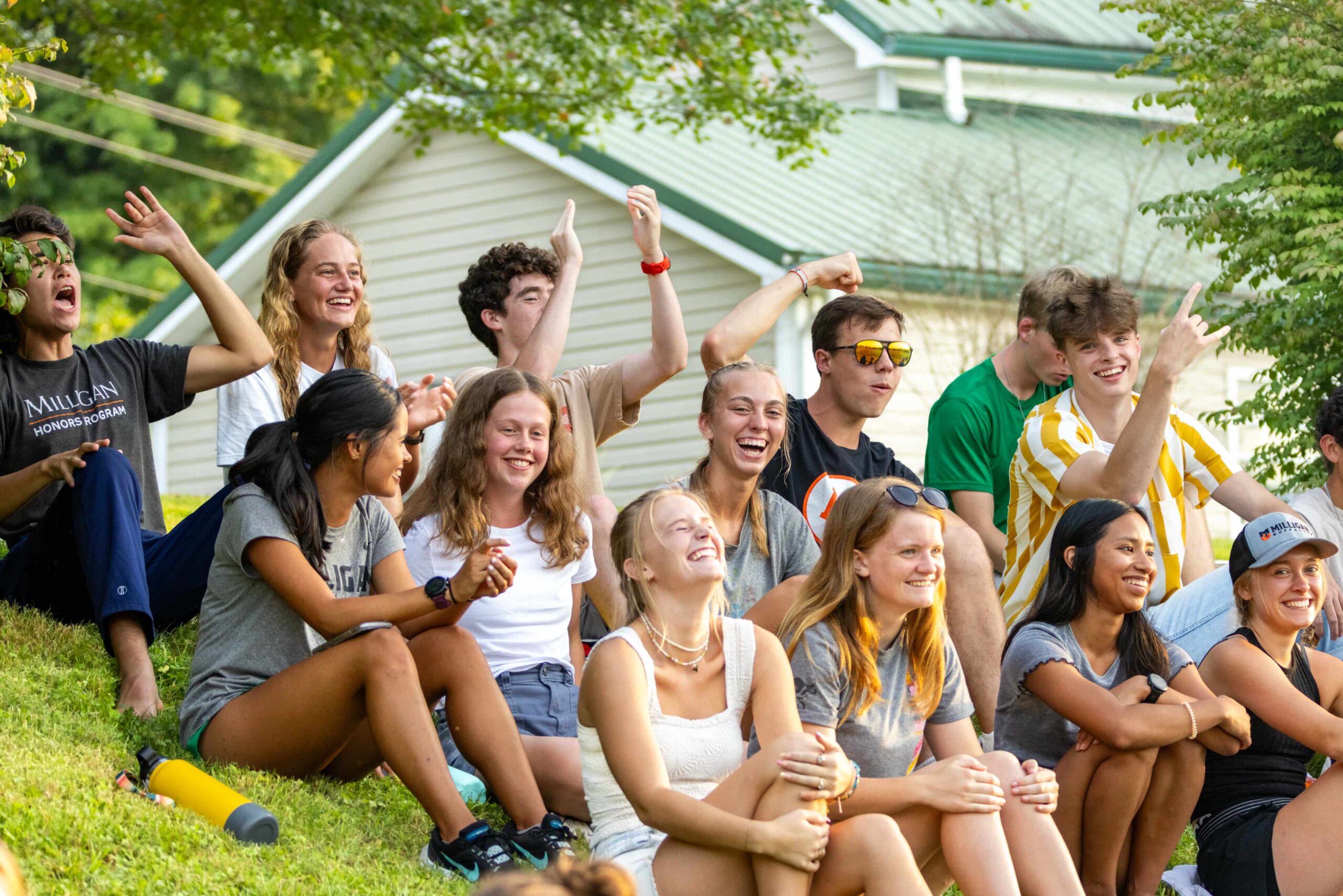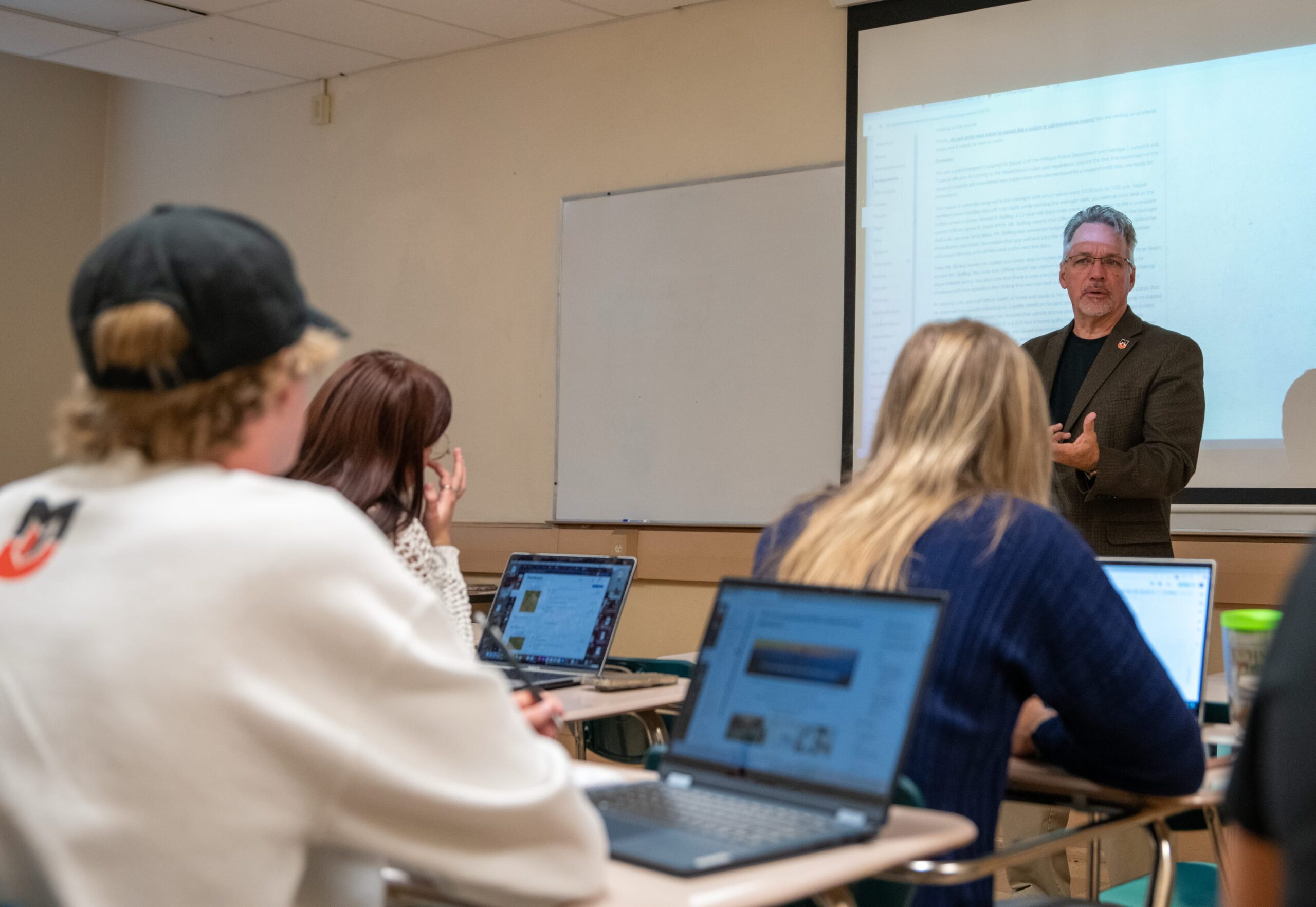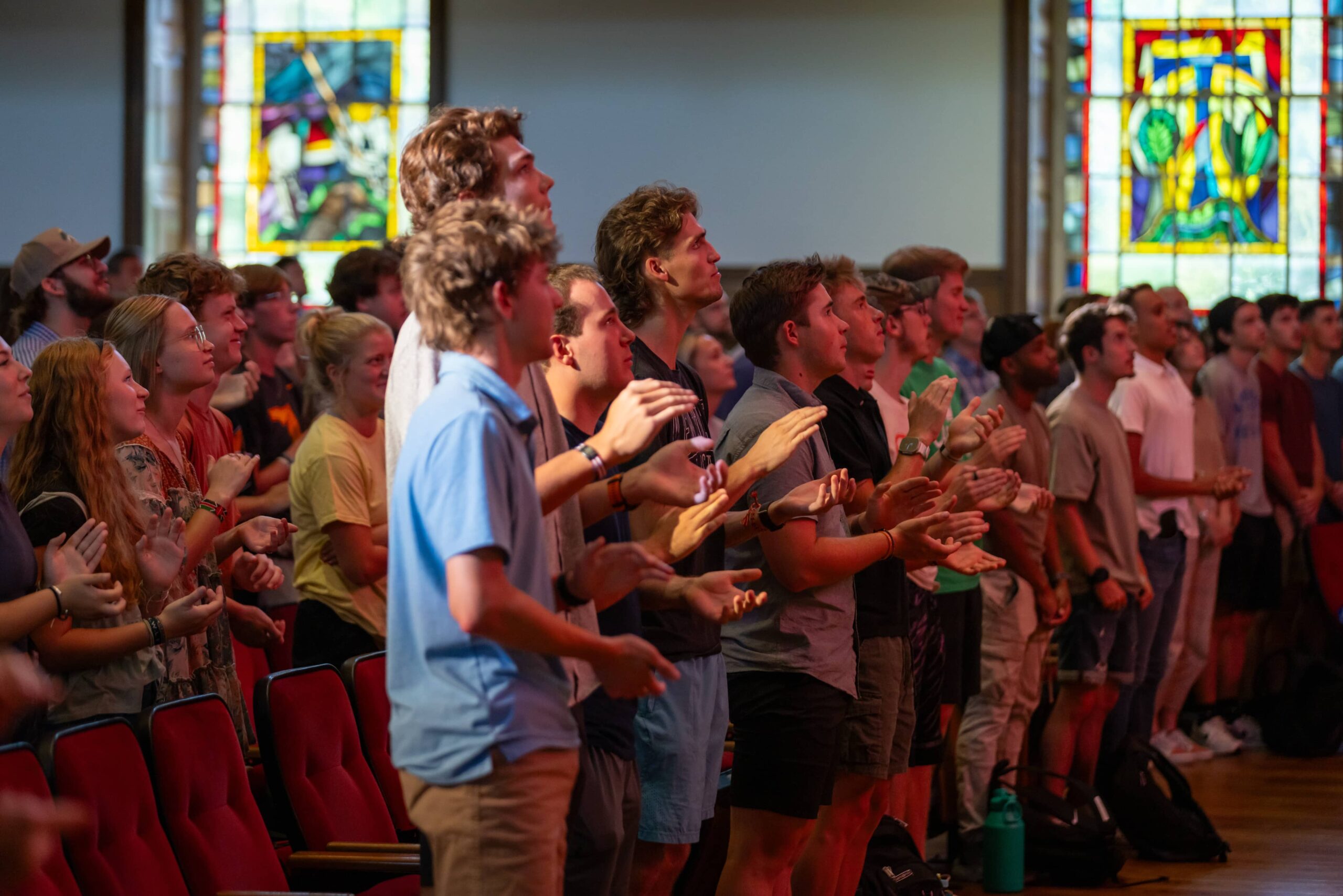Emergency Preparedness
Signs with basic information about procedures that should be followed in the event of various types of emergency situations (fire, severe weather etc.) are posted in the main academic, residential, and student activities facilities on campus. These signs can be found inside the front entrance of each building, in most cases near fire alarm pull stations. Please take a look at these signs at your convenience for information regarding University emergency procedures. A PDF version of the EMERGENCY PROCEDURES sign can be found here.
For more information about campus security or emergency preparedness, please contact Brent Nipper, Director of Property and Risk Management.
Rave Emergency Alert System
Students, faculty, and staff are encouraged to sign up (free) for the RAVE Alert mass notification system, which sends instant text and email alerts about emergency and crisis situations, including weather‐related schedule changes.
Sign up here with your Milligan ID and login information. After opening the link, click on Register and enter your network ID (for students this is the ID you received containing the first four letters of your last name followed by four numbers; for faculty and staff this is your Milligan username) and password. From there you can follow the steps to complete your registration for the types of notifications you wish to receive.
If you have problems registering for the service or have any questions, please contact the IT Help Desk at 423.461.8704 or ITHelpdesk@milligan.edu. Please consider registering for this service, as it provides the fastest and most efficient means of communication possible in any potential emergency situation. The only messages sent through this system are emergency information and weather‐related schedule changes. If at any point you wish to be removed from the notification list, text STOP to 67283 or 226787 from your registered phone.
Annual Security Report
In accordance with the Tennessee College and University Security Information Act of 1989, the Federal Student Right to Know and Campus Security Act of 1990, and the Federal Drug-Free Schools and Communities Act, the University provides an Annual Security Report. This report is available here for download or upon request from the Office of Student Development at 423.461.8760.
Parents and students now also can review campus crime statistics for colleges and university campuses at https://ope.ed.gov/security/.
Title IX/Sexual Misconduct Policy
Sexual Misconduct Policy/Prohibited Behavior
Milligan University is committed to providing students, faculty, staff, visitors and all other members of the university community with a positive, healthy environment conducive to the promotion of the university’s core values of scholarship, community, and faith. Sexual misconduct, including sexual harassment, sexual assault, dating and domestic violence, and stalking as defined in the Milligan University Sexual Misconduct Policy are strictly prohibited.
Title IX of the Educational Amendments of 1972 (Title IX) prohibits discrimination on the basis of sex in education programs or activities, including sexual harassment and sexual violence. The Jeanne Clery Disclosure of Campus Security Policy and Campus Crime Statistics Act (Clery Act) and the Violence Against Women Reauthorization Act of 2013 (VAWA) require institutions of higher education receiving federal funds to disclose policy statements addressing sexual assault, domestic violence, dating violence, and stalking; as well as prevention programs, reporting policies, written notification to victims, and procedures for disciplinary action relating to sexual misconduct issues.
Due to the university’s commitment to an educational atmosphere free of sexual harassment, including acts of sexual misconduct, and in accordance with the requirements set forth in Title IX and the Clery Act, all forms of sexual misconduct are prohibited and will not be tolerated at Milligan University.
The University Title IX Sexual Misconduct Policy is available here. Definitions of sexual assault, domestic violence, dating violence and stalking in Tennessee state law can be found here.
Reporting Process, Rights and Options
Reports of sexual misconduct will be addressed through the university’s Sexual Misconduct Policy when applicable and/or the Disciplinary Guidelines in the faculty, staff and/or employee handbooks. Further information about the reporting process can be found here.
Written documentation about the rights and options of victims of sexual misconduct can be found here, including information about:
- What to do if one experiences an incident of sexual misconduct
- The confidentiality that will be provided to victims and other necessary parties
- Existing counseling, health, mental health, victim advocacy, legal assistance, visa and immigration assistance, student financial aid, and other services available for victims, both within the institution and in the community
- Accessing protective and supportive measures
- Procedures used to investigate and adjudicate cases involving allegations of sexual misconduct
Consent, Bystander Intervention, and Risk Reduction
Unwelcome conduct of sexual nature often results from a lack of understanding and/or consideration of the consent of all parties. Consent is defined in the Milligan Sexual Misconduct Policy as the agreement to engage in sexual activity, which is:
- Voluntary (consent is not possible when coercion, force, or threat is present)
- Aware (consent is impossible when incapacitation occurs, for any reason)
- Clear (silence or absence of resistance does not imply consent)
- Immediate (past consent does not imply future consent)
- Continuous (consent can be withdrawn at any time)
- Specific (consent with one person does not imply consent with others)
All members of the university community are encouraged to always consider and follow the willing consent of all parties in all interactions with fellow students, faculty, and staff members.
Other key factors in the prevention of sexual misconduct include risk reduction and bystander intervention. Risk reduction is defined as options designed to decrease perpetration and bystander inaction, and to increase empowerment for victims in order to promote safety and to help individuals and communities address conditions that facilitate violence. Bystander intervention is defined as Safe and positive options that may be carried out by an individual or individuals to prevent harm or intervene when there is a risk of sexual misconduct occurring and includes recognizing situations of potential harm understanding institutional structures and cultural conditions that facilitate violence, overcoming barriers to intervening, identifying safe and effective intervention options, and safely taking actions to intervene. More information about risk reduction and bystander intervention can be found here.
Related Documents
Milligan University Sexual Misconduct Policy
Milligan Sexual Misconduct Reporting Process
Milligan Sexual Misconduct Policy Rights and Options
Information about Bystander Intervention and Risk Reduction
Definitions of Sexual Misconduct Offenses in Tennessee State Law
Training Materials for University Title IX Officials
Hazing Awareness and Prevention
Hazing is strictly prohibited at Milligan. It is unacceptable in all forms and has no place in the Milligan University community.
Definition of Hazing
Hazing is defined as an intentional, knowing, or reckless act committed by a person, whether individually or in concert with other persons, against a student, regardless of that student’s willingness to participate, that—
- Was committed in connection with an initiation into, an affiliation with, or the maintenance of membership in, an organization (such as a club, society, association, athletic team, fraternity, sorority, or student government)
- Causes or is likely to contribute to a substantial risk, above the reasonable risk encountered in the course of participation in the institution of higher education or the organization (such as the physical training necessary for participation in an athletic team), of physical injury or psychological injury
Examples of Hazing
Examples of hazing include, but are not limited to:
- Whipping, beating, striking, electronic shocking, placing of a harmful substance on someone’s body, or similar activity
- Causing, coercing, or otherwise inducing sleep deprivation, exposure to the elements, confinement in a small space, extreme calisthenics, or other similar activity
- Causing, coercing, or otherwise inducing another person to consume food, liquid, alcohol, drugs, or other substances
- Causing, coercing, or otherwise inducing another person to perform sexual acts
- Any activity that places another person in reasonable fear of bodily harm through the use of threatening words or conduct
- Any activity against another person that includes a criminal violation of local, state, tribal, or federal law
- Any activity that induces, causes, or requires another person to perform a duty or task that involves a criminal violation of local, state, tribal, or federal law
Definition of Student Organization
For the purposes of identifying hazing, a student organization is an organization at an institution of higher education (such as a club, society, association, varsity or junior varsity athletic team, club sports team, fraternity, sorority, band, or student government) in which two or more of the members are students enrolled at the institution of higher education, whether or not the organization is established or recognized by the institution.
Reporting and Investigation of Hazing
All Milligan students, faculty, staff and other members of the campus community who believe that they have witnessed, experienced, or are aware of conduct that constitutes hazing in violation of this policy are encouraged to report the violation to the Dean of Students, Director of Security, Director of Athletics, area vice presidents, or work supervisors. Reports of hazing will be investigated and resolved using the disciplinary procedures found in the student, faculty, and personnel handbooks.
University educational programs relating to the hazing information above and hazing prevention strategies include dissemination of information pertaining to crime prevention via campus email and printed literature, displays and information at college events, programs for students, faculty and staff including residence hall programs and faculty and staff meetings, joint activities with student activities organizations and staff, and other opportunities throughout each school year. New students, faculty and staff are provided with information and/or training regarding hazing as part of annual orientation activities. Prevention strategies include information intended to stop hazing before hazing occurs, and may include skill building for bystander intervention, information about ethical leadership, and the promotion of strategies for building group cohesion without hazing
Hazing in Tennessee State Law
Tennessee state law relevant to hazing in higher education institutions is listed below.
(1) “Hazing” means any intentional or reckless act in Tennessee on or off the property of any higher education institution by one (1) student acting alone or with others which is directed against any other student, that endangers the mental or physical health or safety of that student, or which induces or coerces a student to endanger such student’s mental or physical health or safety. “Hazing” does not include customary athletic events or similar contests or competitions, and is limited to those actions taken and situations created in connection with initiation into or affiliation with any organization; and
(2) “Higher education institution” means a public or private college, community college, or university.
(b) Each higher education institution shall adopt a written policy prohibiting hazing by any student or organization operating under the sanction of the institution. The policy shall be distributed or made available to each student at the beginning of each school year. Time shall be set aside during orientation to specifically discuss the policy and its ramifications as a criminal offense and the institutional penalties that may be imposed by the higher education institution. [Acts 1995, ch. 500, § 1.]
Additional Resources
Hazing Infographic
https://stophazing.org/
https://hazingpreventionnetwork.org/
The Gordie Center/Hazing Hotline
Drugs and Alcohol Awareness Prevention
Expected Standards of Conduct
Milligan University prohibits the use, possession, and influence of alcohol or illegal drugs on campus and at any university functions on or off campus.
In compliance with the Drug-Free Schools and Communities Act, the University prohibits the unlawful possession, use or distribution of drugs and alcohol by students and employees on University property or as any part of University activities.
Students may not possess alcoholic beverages or empty alcohol containers on campus, on university property, in personal vehicles on university property, when participating in school sponsored functions/activities, or in on-campus student living areas. Students present in a residence hall room or in an on-campus apartment where alcohol is present and/or being consumed may face disciplinary action for complicity with an alcohol violation.
Milligan students who are 21 or older and who make a decision to consume alcohol are expected to do so responsibly and to honor the biblical expectations of moderation. Milligan students are expected to observe scriptural instructions which caution against intoxication. Intoxication can occur when consuming alcoholic beverages and also with a variety of other intoxicants, some of which are legal and some of which are not. Students whose drinking creates a risk of danger to the health and safety of themselves or others are subject to disciplinary action.
Students, regardless of age, present in an off-campus setting where alcohol is consumed by an underage student may face disciplinary action for complicity with an alcohol violation. Students who host off campus gatherings are responsible for ensuring the safety, well-being, and conduct of their guests, whether the guests are invited or uninvited. Hosts are responsible to ensure that all guests who choose to consume alcohol do so according to the biblical standard of moderation and university policy.
Applicable Legal Standards
Various federal, state, and local statutes make it unlawful to manufacture, distribute, dispense, deliver, sell or possess with intent to manufacture, distribute, dispense, deliver or sell, controlled substances. The penalty imposed depends upon many factors which include the type and amount of controlled substance involved, the number of prior offenses, if any, whether death or serious bodily injury resulted from the use of such substance, and whether any other crimes were committed in connection with the use of the controlled substance. Possible maximum penalties for a first-time violation include imprisonment for any period of time up to a term of life imprisonment; a fine of up to $4,000,000 if an individual; supervised release; any combination of the above; or all three. These sanctions are doubled when the offense involves either: 1.) distribution or possession at or near a school or college campus or, 2.) distribution to persons under 21 years of age. Repeat offenders may be punished to a greater extent as provided by statute. Further, a civil penalty of up to $10,000 may be assessed for simple possession of “personal use amounts” of certain specified substances under federal law. Under state law, the offense of possession or casual exchange is punishable of a Class A misdemeanor; if there is an exchange between a minor and an adult at least two years the minor’s senior, and the adult knew that the person was a minor, the offense is classified a felony as provided in T.C.A. 39-17-417. (21 U.S.C. 801, et. seq.; T.C.A. 39-17417)
It is unlawful for any person under the age of twenty-one (21) to buy, possess, transport, (unless in the course of his employment), or consume alcoholic beverages, wine, or beer. Such offenses are classified as Class A misdemeanors punishable by imprisonment for not more than 11 months, 29 days, or a fine of not more than $2,500, or both. (T.C.A. 1-3-113, 57-5-301) It is further an offense to provide alcoholic beverages to any person under the age of twenty-one (21), such offense being classified as a Class A misdemeanor (T.C.A. 39-15-404). The offense of public intoxication is a Class C misdemeanor punishable by imprisonment of not more than 30 days or a fine of not more than $50, or both. (T.C.A. 39-17-310)
Health Risks Associated with the Abuse of Alcohol or Use of Illicit Drugs
There are many health risks associated with the use of illicit drugs and the abuse of alcohol including organic damage; impairment of brain activity, digestion, and blood circulation; impairment of physiological processes and mental functioning; and physical and psychological dependence. Such use during pregnancy may cause spontaneous abortion, various birth defects, or fetal alcohol syndrome. Additionally, the illicit use of drugs increases the risk of contracting hepatitis, AIDS, and other infections. If used excessively, the use of alcohol or drugs singularly or in certain combinations may cause death.
Alcohol misuse inhibits students’ development and is negatively correlated with academic success and personal safety. The vitality of the academic community relies on each member taking personal responsibility for his or her actions, including the use of alcohol and for safeguarding the well-being of others. Therefore, Milligan University expects students to observe state laws regarding alcohol use, particularly those that address underage drinking, and the university holds students accountable for their choices regarding alcohol.
Milligan is committed to the intellectual and personal development and Christian discipleship of all students and seeks to emphasize education about the choices, risks, and personal responsibility regarding the use of alcohol.
Drug and Alcohol Programs Available to Employees and Students
Seek help if you are struggling with drugs and/or alcohol and encourage others who may be to do the same. Help is available from:
• Milligan Counseling Center 423.461.8500
• Milligan Student Development After Hours On Call 423.483.8391
• Frontier Health 855.336.9327
• Alcoholics Anonymous
• findtreatment.gov/
Disciplinary Sanctions
PROHIBITED CONDUCT (Alcohol)
- Possession of alcohol or empty alcohol containers on campus
- Underage possession and/or consumption of alcohol
- Complicity in an alcohol violation
Definition: A student who is present and fails to intervene in a situation where another student(s) violate(s) the Milligan University drug or alcohol policy. - Under the influence of alcoholic beverages/intoxication
- Misuse of alcohol: rapid consumption of alcohol, binge drinking, or actions that may endanger the well-being of self or others
- Provision and/or distribution of alcohol to students under 21 years of age
- Irresponsible hosting of event at which alcohol is present
- Alcohol-related vehicular violations
PROHIBITED CONDUCT (Illicit Use of Drugs)
Possession, use and/or distribution of any illegal drug are serious offenses. Consequently, any offender is subject to immediate dismissal or other Disciplinary Sanctions listed below. Sanctions imposed for violation of these guidelines shall be consistent with local, state, and federal law and may include expulsion from the University. Incidents may be reported to proper legal authorities for prosecution by government officials.
Disciplinary Sanctions for violations of the expected standards of conduct are listed above and may include general sanctions, warnings, mandatory counseling, reprimands, work on campus, restitution/apology, exclusion from extra-curricular activities, fines, interim suspension, dismissal, and/or expulsion.
In some cases, students may choose which option listed under the disciplinary sanctions he/she prefers for a first offense. If a second offense occurs, the student may be dismissed.
Statement of Non-Discrimination
In accordance with the Americans with Disabilities Act of 1990 (ADA), Title IX of the Education Amendments of 1972 (Title IX), the Uniformed Services Employment and Reemployment Rights Act, and Section 504 of the Rehabilitation Act of 1973, including all amendments, Milligan University admits students of any race, color, national, and ethnic origin to all the rights, privileges, programs, and activities generally accorded or made available to students at Milligan. Milligan University does not discriminate on the basis of race, color, national and ethnic origin, sex, age, disability, or veteran status in the administration of its educational policies, admissions policies, scholarship and loan programs, and athletic and other school administered programs.
Concerns relating to sex discrimination should be addressed to the University’s Title IX Coordinator:
Brent Nipper, Title IX Coordinator
Director of Property and Risk Management
(423) 461-8740 | Email
The Title IX Coordinator’s office is located upstairs in the Little Hartland Welcome Center
Questions about disability services and ADA compliance issues should be addressed to:
Director of Disability Services
423.794.3088 | Email
For known or suspected instances of racial or ethnic discriminatory misconduct, contact the following:
Student: Dean of Students
Faculty: VP Academic Affairs
Staff: Director of Human Resources







